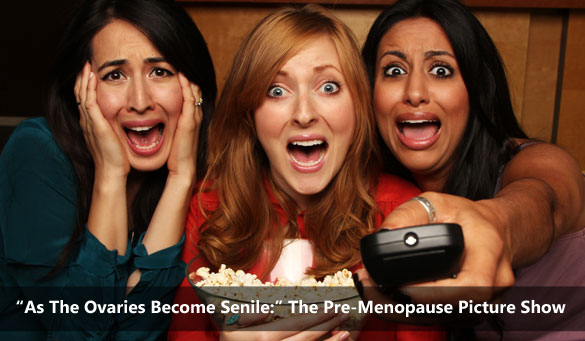Reaching my mid-thirties is just a tad scary. OK, it’s WAY scary… Hot flashes? Check. Insomnia? Check. Mood swings: Check, check, check! Is this pre-menopause?
Naturally-minded, I’m seeking holistic methods for the management of these symptoms, because I know that no doctor is going to give me what I need in the form of surgery or medication. Further, hormone-replacement-therapy scares the daylight out of me. The risks and side-effects don’t look like fun.
Many of us complain that evidence-based women’s health has a long way to go when it comes to diagnosis and treatment of common changes like menopause.
But, after watching this video from the 1950’s it becomes apparent we’ve made a ton of progress. I mean, they’re not giving women radiation for our “senile” ovaries anymore. That’s progress, right?
Nonetheless, we women of later childbearing age must do our homework and take our well-being into our own hands. According to Prescription for Natural Healing (Balch, 2006), there are many things that can help with the common symptoms of perimenopause (“the period when a woman’s body is preparing for menopause”).
Supplements:
Feeling depressed, sluggish, and gaining weight? Coenzymes Q10 and A may help. DHEA could help with memory, but don’t take it if you’re on hormone replacement therapy.
One of my ultimate favorite supplements right now is Evening Primrose Oil. I’ve been taking 1000 mg in the morning and 2000 mg before bed. It helps not only relieve terrible PMS symptoms like cramping, but also helps with sleep and the prevention of night sweats, of which I have been plagued for years. Evidently, this wonderful oil helps in the body’s natural production of Estrogen.
A B complex is always important, and helps with adrenal function to prevent symptoms of stress. I take a methylated form of B vitamins because I have a MTHFR genetic issue which prevents me from processing folic acid. If you’ve tried B vitamins before and didn’t notice an improvement, ask your doctor to prescribe a methylated form. It’s a bio-available form of the vitamin and may be the type your body needs.
Herbs:
Are you into herbs? Damiana can increase the libido. Having trouble sleeping? Hops and valerian root to the rescue! Want some relief for hot flashes and depression? Try gotu kola, black cohosh, red clover, and dong quai. Siberian ginseng can help with depression and the production of estrogen.
Diet:
I’ve been eating a lot more raw food and have noticed a difference. 50% raw is the recommendation, but I’m not there yet. A smoothie in the middle of the day is helping me reach that goal. I always add a bit of protein to help stabilize the blood sugar. I’ve also added flax to two meals a day (breakfast and lunch), as well as nuts, whole grains, and apples. These foods are widely and often consumed in Asian cultures where women rarely suffer from menopausal symptoms.
Animal and dairy are a no-no for me. This especially became apparent after I became a mother and my hormones went extra-crazy, accompanied by gastrointestinal issues in my breastfeeding baby and in myself. Yogurt and raw milk seem to be OK, and are recommended by Balch.
The Future of Women’s Health
Are we where we want to be? No, but we have definitely gone in the right direction. This gives hope to progressive, smart health care for women, and our babies’ generation. Let’s educate ourselves and take the reins in our well-being.
Disclaimer: I’m not a physician. I have a degree in holistic health. I encourage research and self-advocacy for all women. If you need help with diagnosis or treatment of any illness, please consult a licensed healthcare worker.

